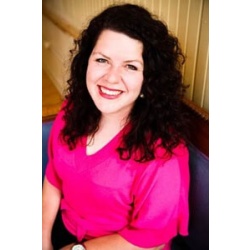
Luther's Amy Weldon publishes debut novel
Posted: Mon, Sep 2, 2019 11:22 AM
(Story by decorahnews.com's Ben Gardner):
For Luther College English professor Amy Weldon, the inspiration for her debut novel, "Eldorado, Iowa," came on an unseasonably warm autumn day in 2008. It was a lovely sunny day, Weldon told me during our interview, and she was teaching her creative non-fiction writing class on the sun-dappled quad outside Main Building at Luther College. Her students were organized in small groups, reading and discussing each other's work, and Weldon was walking slowly among them, listening to the discussions of her earnest young students.
Suddenly, when she looked down, instead of her own feet, she saw a pair of boots--women's boots, old, from the 19th Century—and they were walking through prairie grass. In retrospect, Weldon describes this as a "waking dream." She also describes the experience as giving her the "instigating image" of the novel and crystalizing, for Weldon's craft and teaching method, the importance of "image."
The image of the woman on the prairie also gave Weldon a mystery to solve: Who was this woman in the boots? Solving that mystery and all the subsequent mysteries and problems that arise in novel-writing would inevitably lead Weldon to the publication of her debut novel, "Eldorado, Iowa."
The novel tells the story of Sarah Archer, a young doctor's pregnant wife, as she and her husband settle into frontier life in post-Civil War Iowa. But the novel is also heavily indebted to the Southern Gothic tradition (Faulkner, Flannery O'Connor, Styron): ghosts of the past haunt the present. In "Eldorado, Iowa," Sarah's thoughts are continuously tugged towards memories of her childhood on her family's Alabama plantation, as well as her love affair with an enslaved boy. In the southern Gothic tradition, history and biography have an immediate, often violent, influence on the present. The history of slavery, the Civil War, and the forced migration of Native Americans are all a brooding presence in Weldon's novel.
In our interview, Weldon describes herself as a fast writer; "perhaps too fast." She's also versatile, leaping from one subject—the philosophy of Hannah Arendt—to another—the life and work of Mary Shelley. She admits this versatility can also be a weakness, a lack of focus. To address this weakness, Weldon has created systematic ways of storing and cataloging information and potential subjects, to prevent potential projects from being lost. This means always caring a notebook (she takes notes during our interview) and diligently cataloging its contents on her computer.
"The thing about writing," says Weldon, "is it seems really scary till you do it. It's not easy to write, but the only way to get more experience is to do the work." Weldon is familiar with work; she's been prolific while teaching a full course load in the English Department. In addition to "Eldorado, Iowa," she's also the author of "The Writer's Eye: Observation and Inspiration for Creative Writers" and "The Hands-On Life: How to Wake Yourself Up and Save the World."
Prior to the conception of "Eldorado, Iowa" in 2008, Weldon had already put a lot of work—150 pages—into a different novel. In the summer of 2008, Weldon brought the manuscript of her novel to a writer's workshop out of state, where author Colson Whitehead, winner of the Pulitzer Prize and the National Book Award, facilitated a workshop and critiqued her novel and offered advice for revision.
However, a few months later, Weldon's imagination would be overcome with the image of the boots in the grass and she'd abandon her 150-page manuscript. ("It remains tucked far away," Weldon confides.) Weldon remarks that people are often dismayed by her decision to put all that work aside. She shrugs, "There's no wasted writing."
Weldon had to do a lot of research for "Eldorado, Iowa." To convey authenticity to the reader, she needed to know settlement patterns in Iowa, including the continual western migration of Native Americans. Weldon says: "I also simply needed to know where they were getting their food." In her novel, the main character is pregnant and Weldon, never being pregnant, had to go to the Decorah Public Library and get a copy of "What to Expect When You're Expecting." Recalling it to me during our interview, the anecdote is amusing, but more importantly the research provided telling detail to her depiction of Sarah, the novel's heart and center.
Weldon has an eye for detail, knowing that there's much truth to the adage: "Detail is the soul of narrative." Reading "Eldorado, Iowa," I'm reminded of the work of Toni Morrison, Louise Erdrich, and Barbara Kingsolver: three writers adept at using description of place and nature to convey character and theme. Again, image is important for Weldon: rather than tell the reader about a character's thoughts, she prefers to use action and dialogue to convey the nuances of her characters. For a reader, this is a refreshing way to discover the mind of a character.
Weldon is likely the leading expert in Decorah on contemporary literary fiction and the craft of fiction writing. Consequently, she's routinely barraged for book recommendations. So I couldn't help but ask what she's loved recently and what she's currently reading.
Notable New Releases:
-"The Nickel Boys" by Colson Whitehead
-"Circe" by Madeline Miller
-"The Great Believers" by Rebecca Makkai
-"The Most Fun We Ever Had" by Claire Lomardo
-Oldie but a goodie: "The King Must Die" by Mary Renault
-And a notable book she's been savoring for six months: "The Way of the World" by Nicholas Bouvier
Weldon will read from her novel at Dragonfly Books at 7 p.m. on Monday, September 9th.
Copyright © - decorahnewsarchive.com. All rights reserved.| Terms Of Use Statement.

Site designed and maintained by Iroc Web Design Services©.
Your Small Business Web Design Solutions.™
Site designed and maintained by Iroc Web Design Services©.
Your Small Business Web Design Solutions.™


